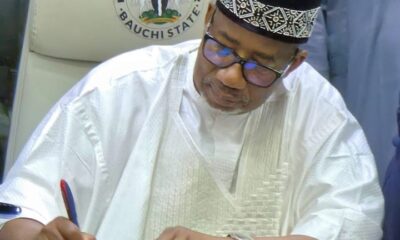News
Tackle rubber sub-sector, if Nigeria must be self sufficient on food security – Dongo tells FG

From Ene Asuquo, Calabar
The executive Director, Rubber Research Institute of Nigeria (RRIN), Lelia Nkechinyere Dongo has called on the Federal Government to prioritize the natural rubber sub-sector, if food sufficiency must be realized.
She made the call in Calabar recently when she spoke to journalists after the just concluded 46th National Council on Agriculture and Food Security, stressing that the country does not need to import all necessary irrigation facilities required for all year farming if the needed attention is given to the rubber sector.
Dongo said she felt saddened by the neglect of rubber, even as she called on policy makers in the agric sector to support research on the development of rubber to attract more investors to the industry to enhance foreign exchange earnings of the country.
“We’ve presented a memorandum on the development of early maturing rubber cultivars which is a major challenge to the sustainability of the rubber sector to the National Council on Agriculture and Food Security, that met in Calabar this week. The paper has been approved by the Council”.
She stated further that the long gestation period of rubber which is about 7 years has deterred many farmers from cultivating rubber, stressing on the importance of reducing the gestation period to three years to encourage many more farmers to go into rubber cultivation to increase productivity.
Failure to do this she said will impact negatively on the present Administration’s efforts to increase rubber cultivation at a growth rate of 5.7% annually. This she said is achievable through molecular breeding as was done in cocoa.
Poor Sanitation increases diseases among children, adolescent girls – UNICEF
“Nigeria should tap into the huge potentials of natural rubber. It is the only commodity that has over 50 products in more than 400,000 applications. There is virtually no sector of life that does not require rubber be it in automobile, medical, clothing etc. It is time we develop a rubber policy to drive the sector like other countries”.
“Ivory Coast produces over 1.8m tons of rubber annually and currently ranks number three in the world whereas Nigeria which was a leading nation in Africa before the discovery of crude oil now ranks a distant 13th, producing a mere 167,000 tons annually. In 2018, the exchange earnings from rubber was US$42.8m which significantly increased to US$102.5m in 2023”.
“This is even as the country has not paid the desired attention to rubber and its allied products in the value chain”.
“Another memorandum which was presented to the National Council on Agriculture and Food Security is the establishment of 30,000 of rubber based agroforestry plantations to empower youths through job creation and enhance food security in the nation. This was again approved by the council for financial intervention”, she stated.
















